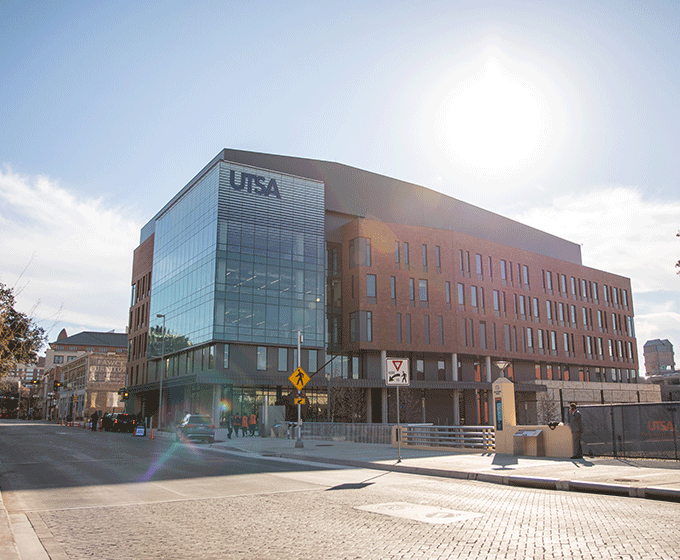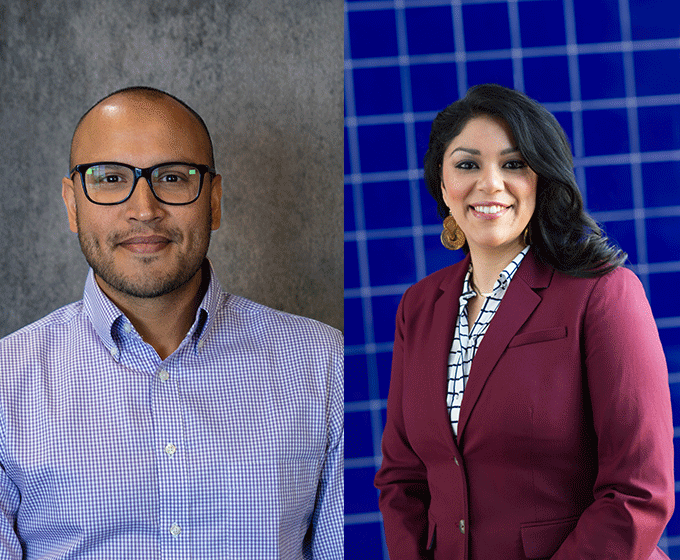
APRIL 9, 2024 — Utilizing part of a $2 million gift from H-E-B announced last December, the UTSA School of Data Science (SDS) is launching the Data Science and AI Community Innovations Scholars program, a paid data science internship that is designed to help students explore data science careers. The program will pair undergraduate students from any major with local nonprofits in need of data science support.
The $2 million gift funding the program is being split between the SDS and the Margie and Bill Klesse College of Engineering and Integrated Design, specifically for the college’s Prefreshman Engineering Program (PREP).
The gift is the result of a long-term partnership between UTSA and H-E-B and a shared interest in developing and supporting career-engaged learning programs in the San Antonio area.
H-E-B has a profound commitment to education and is proud to support tech learners and leaders who will shape the future workforce in San Antonio and beyond, said Winell Herron, H-E-B Group vice president of public affairs, diversity, and environmental affairs.
Students will earn a $3,000 stipend for their participation in the 10-week program, which will run from Monday, May 20, through Wednesday, July 31. The internship will focus on supporting mission-driven organizations, said UTSA School of Data Science Senior Program Manager Lizet Casas.
"Some interns could be exploring better ways for nonprofits to collect data while others may be analyzing some of the data that the nonprofits have already collected. The projects will depend upon the nonprofits' needs. An intern, for example, may look at different insights that can help an organization make better decisions about their limited funding,” Casas explained.
Data science in social services — frequently termed “data science for social good” — is not new, this internship program’s strong ties to the local community make it unique.
“We have funding coming from a localized source and impacting local nonprofits through students who are in the San Antonio community,” Casas said. “We are trying to make a greater impact in one area, whereas a lot of the programs that have been doing data science for social good feature organizations from all over, not necessarily local nonprofits funded locally.”
Another distinguishing factor of the new internship is application eligibility, said School of Data Science Manager of Strategic Initiatives Amanda Mukengeshayi Brown.
“What distinguishes this program from the rest is that we’re really focusing on undergraduate students, because most of these programs cater to graduate and even post-doctoral applicants,” Brown said. “It’s very rare to strictly limit the applicant pool to just undergraduate students.”
Preparing undergraduate data science students for their careers is a goal shared by both H-E-B and the School of Data Science, she added.
 Arka Roy and Vanessa Sansone will serve as faculty advisors for the program.
Arka Roy and Vanessa Sansone will serve as faculty advisors for the program."We're focusing our programmatic resources on these students so they can receive additional support and guidance from faculty at this phase of their academic journey, when they should be exposed to the different career pathways in the data science field,” she said.
The data science and AI internship is not limited to students studying science, technology, engineering or mathematics (STEM) but is open to all majors, provided they have accrued 60 credit hours and some preliminary coursework. While applications are closed for this year, Brown encourages all eligible students to consider applying next year.
Moreover, the program organizers are working to ensure resources are available to students less familiar with coding and other data science techniques. They recognize that students possess a variety of talents and skills to collaborations with their classmates. Even students who aren’t planning on making a career in data science can benefit from the internship.
“The beauty of this program is that a lot of students who are interested in social services, who are interested in working for nonprofits or in public service, will still have a skill that’s very needed in our community,” Casas said.
This initiative is in alignment with UTSA’s mission to have 75% of its undergraduate students participate in some form of experiential learning before graduation. The Data Science and AI Community Innovation Scholars program offers students a hands-on opportunity to apply their skills in a real-world setting, contributing to both their personal and professional development while serving the community.
Additionally, Brown believes the internship will help UTSA and the School of Data Science stand out from other institutions and hopes it becomes a lasting opportunity for data science students.
“This is just one step toward solidifying our position, not only among other universities and institutions but even here in the community,” she said. “I want this to become a staple for the School of Data Science. I want this program to become renowned for really catering to undergraduate students and engaging them with local employers so they can give back to their community with their skills and talents.”
For the internship’s first year, Casas plans to accept approximately 12 interns. By keeping the number small, she said, the School of Data Science can provide each student with the maximum possible support. Once the first cohort of students and nonprofits have completed the program and shared feedback, she hopes to accept more interns, including additional nonprofit organizations and to explore avenues to support placing program alumni with the nonprofits upon graduation.
“I want to make sure all the students have the opportunity to take advantage of this process. We want to hear from them and learn from them so we can offer more programs like this in the future,” she said.
Brown said she hopes students will leave the program with an increased awareness of their career opportunities and the ways they can put their interests and talents to use to make a difference in the world.
“You don’t necessarily have to go into tech or the corporate world,” she said. “There’s actually a need out there, in the nonprofit community, for data scientists to do good locally.”
UTSA Today is produced by University Communications and Marketing, the official news source of The University of Texas at San Antonio. Send your feedback to news@utsa.edu. Keep up-to-date on UTSA news by visiting UTSA Today. Connect with UTSA online at Facebook, Twitter, Youtube and Instagram.
Move-in Day is an exciting time for incoming students. Students living in Alvarez Hall (2nd and 4th), and Chisholm Hall are moving in on August 19. The UTSA Housing and Residence Life (HRL) team looks forward to welcoming you all and helping you settle into your room.
Alvarez Hall and Chisholm HallMove-in Day is an exciting time for incoming students. Students living in Chaparral Village move in from August 20-21. The UTSA Housing and Residence Life (HRL) team looks forward to welcoming you all and helping you settle into your room.
Chaparral VillageMove-in Day is an exciting time for incoming students. Students living in Laurel Village move in on August 22. The UTSA Housing and Residence Life (HRL) team looks forward to welcoming you all and helping you settle into your room.
Laurel VillageThe College of Sciences welcomes our newest Roadrunners to UTSA at VIVA Science! This interactive event connects students with faculty, staff, student leaders, and peers while highlighting the opportunities available across the College.
Outdoor Learning Environment 2 (OLE), Flawn Building, Main CampusWe're excited to welcome the new class of UTSA College of Liberal and Fine Arts (COLFA) students to campus! Move In To COLFA is strongly recommended for new students in COLFA because it gives you the chance to learn about the Student Success Center, learn how to do college successfully and meet new friends.
Galleria (MH 2.01), McKinney Humanities Building, Main CampusBuild connections with your Alvarez College of Business peers and learn more about the Career Compass program! This opportunity will provide fun interactions, giveaways and a chance to meet your next friend!
Richard Liu Auditorium (BB 2.01.02,) Business Building, Main CampusCelebrate the end of summer and the start off a great fall semester with The Housing Block Party! This event will have live music, carnival-style treats, artists, games, and activities galore. Come and join us for a night of fun!
Multipurpose Room/Lawn, Guadalupe Hall, Main CampusThe University of Texas at San Antonio is dedicated to the advancement of knowledge through research and discovery, teaching and learning, community engagement and public service. As an institution of access and excellence, UTSA embraces multicultural traditions and serves as a center for intellectual and creative resources as well as a catalyst for socioeconomic development and the commercialization of intellectual property - for Texas, the nation and the world.
To be a premier public research university, providing access to educational excellence and preparing citizen leaders for the global environment.
We encourage an environment of dialogue and discovery, where integrity, excellence, respect, collaboration and innovation are fostered.